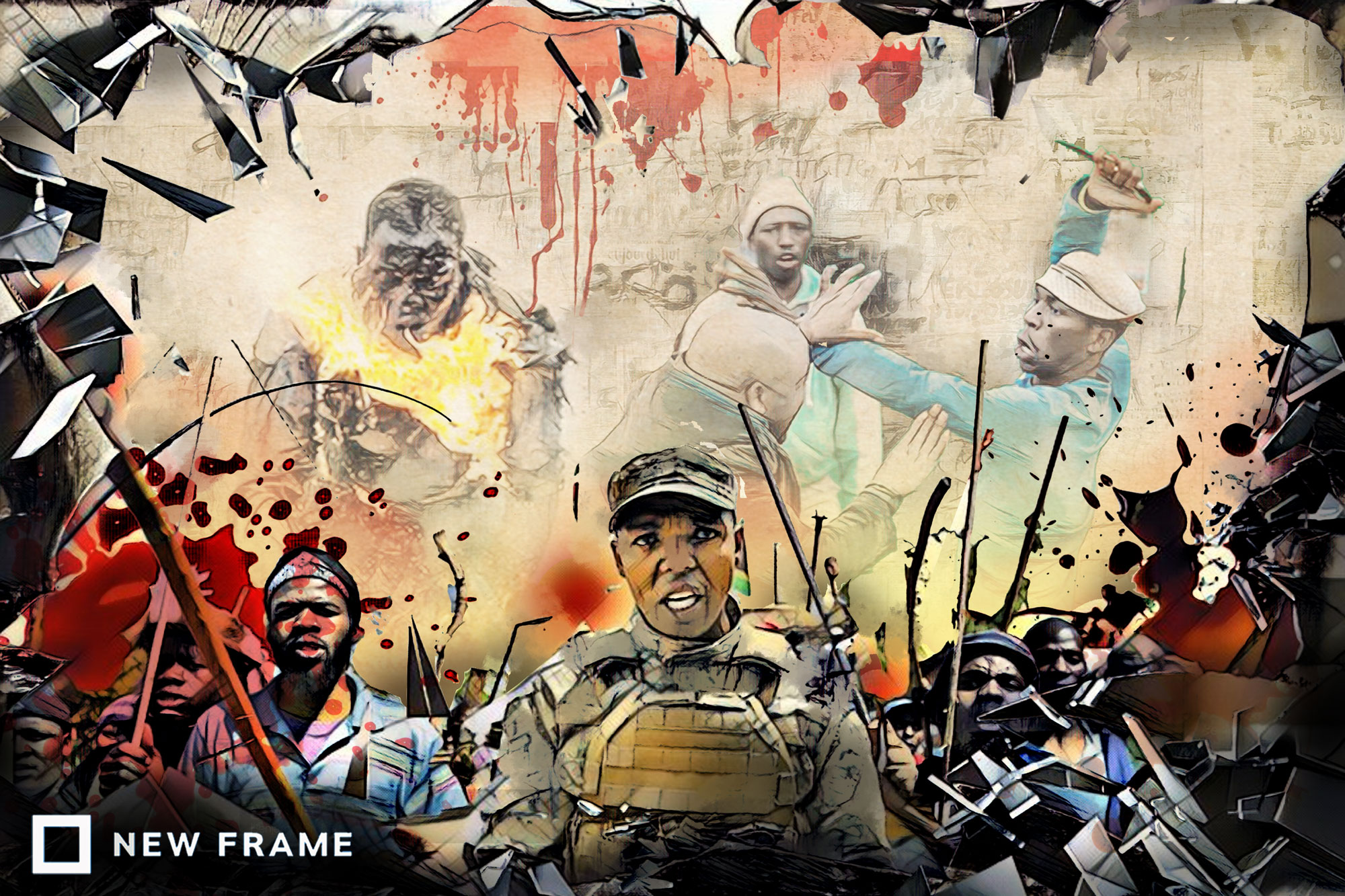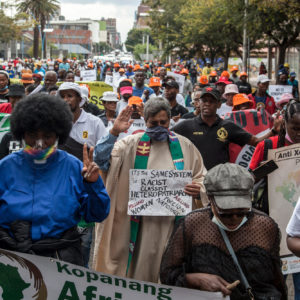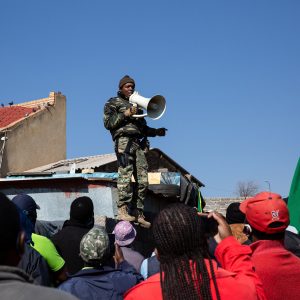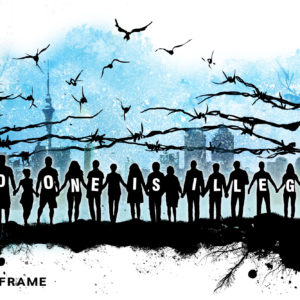Xenophobia and the rise of fascist rhetoric
Government ministers and political leaders are going along with extremist Nhlanhla ‘Lux’ Dlamini in blaming migrants for the country’s problems. More violence will surely follow.
Author:
6 April 2022

It’s been 14 years since the worst outbreak of xenophobic violence in South Africa, where more than 60 people were killed and hundreds displaced. In all that time, the government has failed to prevent further attacks on migrants and has not introduced meaningful or lasting interventions to address the social and economic problems that sparked the violence.
Since the start of this year, we have witnessed the further normalisation of xenophobia in our national politics. Patriotic Alliance’s Gayton McKenzie led raids on migrant-owned businesses and encouraged the harassment of staff at the City of Johannesburg Council while Julius Malema and the Economic Freedom Fighters intimidated migrant waiters at restaurants in Gauteng.
Political parties across the board have also increasingly shifted their position on migration as a means to win votes. This has coincided with the rapid rise of the #PutSouthAfricansFirst group on social media and of the vigilante group Operation Dudula and its leader Nhlanhla “Lux” Dlamini.
Related article:
The government’s failure to address the unemployment crisis, which the Covid-19 pandemic has exacerbated, has created a breeding ground for further violence. Despite policies such as the national action plan to combat racism, racial discrimination, xenophobia and related intolerance, the state seems unable and unwilling to act in any meaningful way.
Even in the face of the brutality of xenophobic attacks – captured most forcefully in the widely circulated photographs of Ernesto Alfabeto Nhamuave’s charred body (“the burning man”) in May 2008 and images of the brutal murder of Emmanuel Sithole on the streets of Alexandra in April 2015 – and the chaos of extended periods of violence in 2015, 2017 and 2019, law enforcement and politicians have often dismissed xenophobic violence as random acts of crime.
Nhamuave’s murderers are yet to face justice, and one can only assume the reason Sithole’s murderers were arrested quickly and sentenced to prison is because their faces appeared on the front page of the Sunday Times. Dozens of other migrants who have been killed in xenophobic violence have died nameless and their murderers still walk free.
Blaming migrants
Part of the problem of viewing xenophobic violence in South Africa as something that occurs in waves or sporadic outbreaks, as the media tend to describe it, is that it ignores the day-to-day incidents of harassment, intimidation and violence that migrants experience in the streets, their businesses, trying to register their children at schools and accessing healthcare in South Africa.
This incremental and constant violence coincides with the rise of a fascist rhetoric embodied in Dlamini’s public persona and in the language he uses. Dlamini is a self-styled military commander, giving off a sense of hyper-nationalism in which he and his supporters want to rid the country of “illegal immigrants” whom they accuse of committing crimes and jeopardising the country’s sovereignty.
Dlamini was recently charged with housebreaking with intent to steal and malicious damage to property after he and members of Operation Dudula raided a Soweto resident’s house, accusing him of selling drugs.
During his court appearance Dlamini was photographed saluting, and following his release on bail, his cult-like followers cheered him on. The Operation Dudula Twitter account recently tweeted about an alleged plot to kill Dlamini, while also calling for volunteers to join its armed military wing.
Related article:
That a figure like Dlamini exists is not surprising. What is shocking is that senior voices in the ANC government repeat the bile Dlamini spews on public platforms. Echoing these messages only serves to normalise and entrench these views, creating room for even more extremists to emerge.
Home affairs minister Aaron Motsoaledi has already shown his disdain for migrants, blaming them for the failing healthcare system and other social ills. Recently, in an interview with SABC after a raid on a passport syndicate that sold South African passports to migrants, Motsoaledi said: “They were never refugees in the first place. They are making us fools. That is why I am not in any way touched by the allegations that we are xenophobic in South Africa. We are being undermined because this is not happening in any other country on our continent … They only do it in South Africa because they believe our laws allow them to do that and some of them even say, ‘No, the constitution in SA allows you to do any hooliganism,’ you know? And that must come to an end. I am not going to accept that.”
Clayson Monyela, head of public diplomacy at the Department of International Relations and Cooperation, recently tweeted: “Agreed. An illegal immigrant by definition is already a ‘law breaker’. They crossed the border through illegal means. Refugees fleeing from armed conflicts or political persecution are, of course, a different category. Solutions to this start with unapologetically enforcing SA laws.”
In another tweet responding to an article about the violence Operation Dudula meted out against migrants, he responded: “This is how some sections of the media manufacture false narratives that wrongly tarnish our country’s image. Which ‘attacks on foreign nationals’? The article is laced with innuendo that exposes the writer’s prejudices.”
Related article:
Answering questions at the National Council of Provinces in March, Deputy president David Mabuza repeated a line xenophobes often utter: “Our immigration system is grappling with the implementation of stringent measures to deal with the influx of undocumented foreign nationals into our country, who ultimately compete with our citizens for limited resources to survive,” he said. “This competition often leads to tensions in many communities, which then manifests in different forms of campaigns and actions that in the main have negative undertones.”
The latest estimates by Statistics South Africa puts the number of migrants, including undocumented people, at around 3.95 million people. Despite this, politicians and the xenophobes behind groups such as Operation Dudula and #PutSouthAfricansFirst often circulate wildly exaggerated claims about how many migrants live in the country.
If there is no serious condemnation by society of the rising xenophobic tensions, including more organised interventions from trade unions and others opposed to the violence and fascist rhetoric, it will continue to fester and spread.



